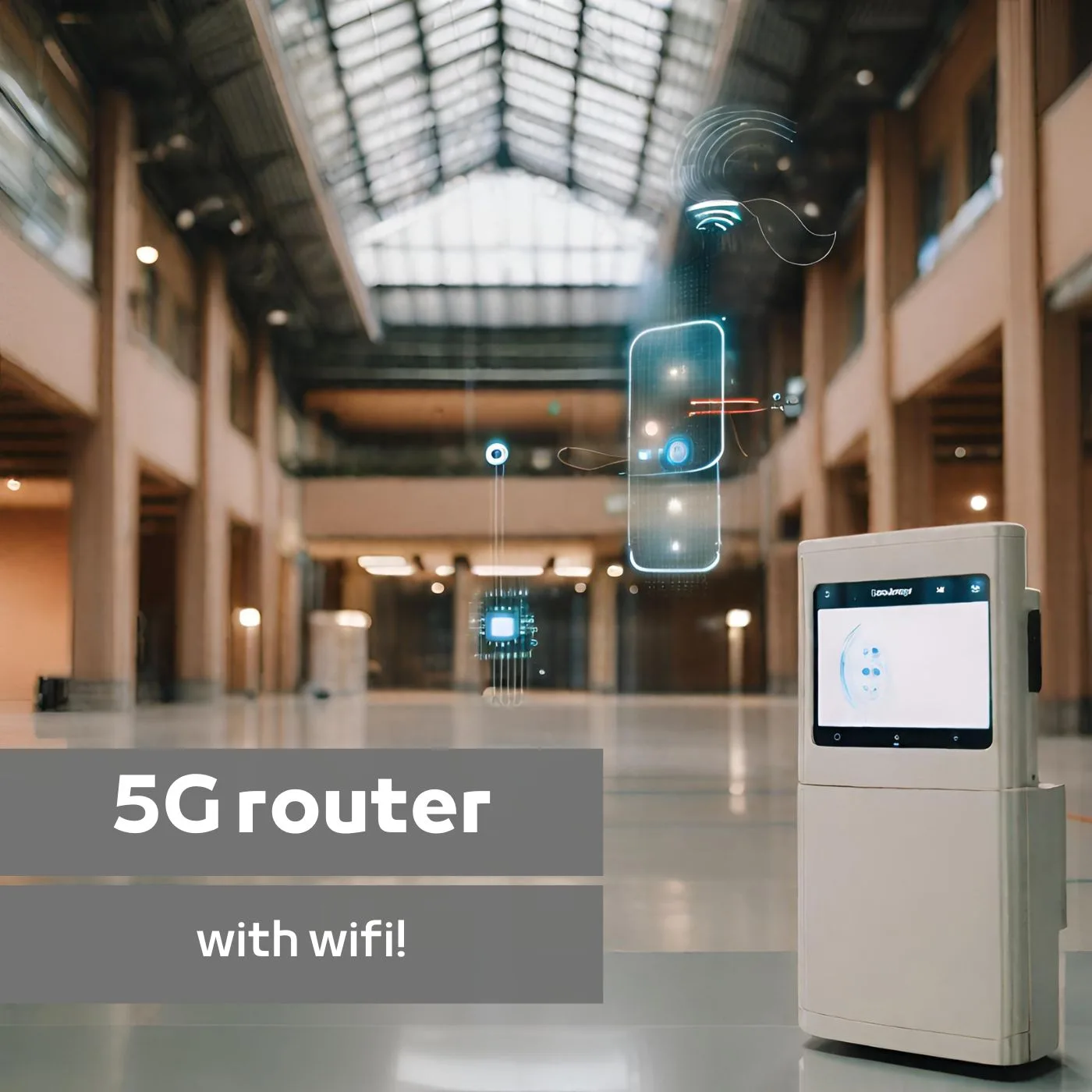 5G—and especially well-built private 5G networks—can deliver speeds and response times that compete with fixed connections. But what should you consider when purchasing a 5G router to connect devices via WiFi? A 5G router with WiFi allows you to wirelessly connect nearby devices. This wireless connection can be used to share an internet connection (hotspot), connect sensors and other devices, or configure the router and network devices during installation and operation. But what distinguishes different 5G routers with WiFi, and when should you be extra cautious before investing? Let’s explain!
5G—and especially well-built private 5G networks—can deliver speeds and response times that compete with fixed connections. But what should you consider when purchasing a 5G router to connect devices via WiFi? A 5G router with WiFi allows you to wirelessly connect nearby devices. This wireless connection can be used to share an internet connection (hotspot), connect sensors and other devices, or configure the router and network devices during installation and operation. But what distinguishes different 5G routers with WiFi, and when should you be extra cautious before investing? Let’s explain!
5G + WiFi = wireless and convenient
A 5G router with WiFi is perfect for creating a local connection where no fixed connection exists. It can be used for temporary or permanent wireless internet connection in places without conventional broadband or as a backup to a fixed internet connection. Thanks to mobile network speeds, these routers can sometimes offer higher speeds than fixed connections, faster installation times, and lower installation costs.
Where fixed internet is impractical…
Additionally, there are situations where fixed internet is impractical, such as in vehicles, mobile machines, construction trailers, and other temporary installations. 5G can also serve as a backup for fixed internet if the connection is lost, for example, in stores using 5G as a backup connection.
Why choose a 5G router with WiFi over a 4G router with WiFi?
While both 4G and 5G routers with WiFi offer wireless connectivity, 5G technology has several advantages that make it a better choice for the future:
- Higher speeds: 5G can offer much higher data transfer speeds compared to 4G, which is crucial for applications that require high bandwidth, such as high-resolution streaming, video conferencing, and gaming.
- Lower latency: 5G technology has significantly lower latency than 4G, meaning faster response times. This is especially important for real-time applications like online gaming and video meetings.
- Better capacity: 5G networks can handle more simultaneous devices without performance degradation, making them ideal for environments with a high density of connected devices.
- Future-proof investment: By choosing a 5G router, you ensure that your network is ready for future technologies and services that will benefit from 5G’s capacity and speed.
Shopping for a 5G router
Now that you’ve determined that a 5G router is the right solution for your application, how should you shop for one? The selection is vast, and how do you know which router is the best? Like in many other areas, you must start by considering what you REALLY need.
1. How many users and devices will be connected simultaneously?
Will the router need to support many simultaneous users via WiFi? This is a central question. If you need to connect more devices, you must ensure your router can handle it. A 5G router typically supports many users—hundreds even—but all share the bandwidth, so it also depends on the application.
2. What will the network be used for?
Will you browse locally for configuration or offer wireless connectivity on a bus? Check which wireless standards and frequency bands the router uses. 2.4 GHz is the most common and provides better coverage but lower performance than 5 GHz. For better performance, opt for 5 GHz and consider WiFi 5 (802.11ac) or WiFi 6 (802.11ax) for faster and more reliable connections, especially in environments with many simultaneous devices.
3. Which WiFi standard is supported?
WiFi 5 (802.11ac) and WiFi 6 (802.11ax) are the latest standards that offer higher speeds, better performance, and greater capacity compared to older standards like WiFi 4 (802.11n). WiFi 6, also known as 802.11ax, offers several advantages:
- Higher speeds: Up to 9.6 Gbit/s, which is nearly three times faster than WiFi 5.
- Better capacity: Handles more devices simultaneously, ideal for environments with a high density of connected devices.
- Lower latency: Improved performance in applications like gaming and video streaming.
- Increased efficiency: Better battery life for connected devices through Target Wake Time (TWT).
4. Easy management of router functions. RADIUS compatibility?
RADIUS is a system for managing authentication and authorization. A 5G router can operate without RADIUS or as a RADIUS client/server. RADIUS offers high security and is worth considering if you need these functions, especially if you have more than five simultaneous connections.
5. WiFi everywhere? WiFi MESH?
If you need to cover a larger area with strong and stable WiFi, it’s important that your router supports WiFi MESH. This system uses multiple units to create a single, seamless WiFi network over a large area, making it perfect for large offices, warehouses, or homes with many rooms.
6. Stable connection? Stability and performance?
For robustness and reliability, choose a professional router with QoS (Quality of Service), remote management, and reliable performance. A professional router offers stronger security features and greater flexibility to manage your network from remote locations, as well as the ability to scale up or down. A good investment is a router with reliable WiFi connectivity and operational continuity.
7. Secure and protected with security features
Security is an important factor, especially for businesses. Make sure the router has up-to-date security features, including WPA3 support for better encryption, VPN features for secure remote access, and regular firmware updates to protect against new threats.
8. Bandwidth management
The ability to prioritize traffic with Quality of Service (QoS) can be crucial to ensuring that important applications get the bandwidth they need. QoS can help improve performance for streaming, VoIP, and other critical services by prioritizing them over less important traffic types.
9. Mobility and portability
If you frequently change locations or use the router in different environments, it’s worth considering a model that is easy to install and, in some cases, reconfigure. Routers designed for mobile use may have features like quick installation, easy configuration, and robust constructions that withstand tough environments. This is especially important for use in construction trailers, vehicles, or other temporary installations.
10. Price and value
Price is always an important factor. The balance between price and the features offered should be carefully considered to ensure that you get the best value for your money. A more expensive router can offer better performance, more features, and higher reliability, which may be worth the extra investment for long-term use.

